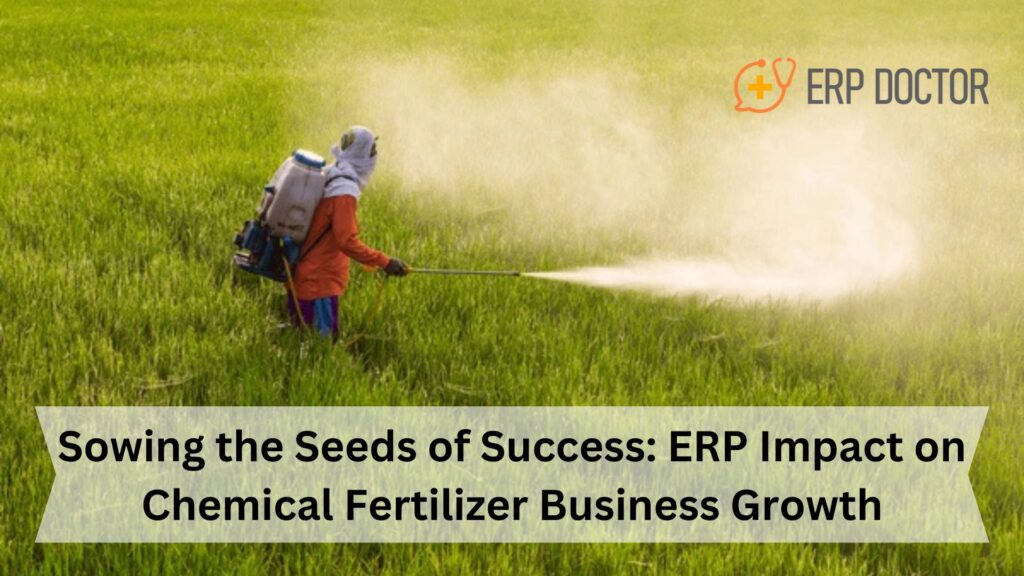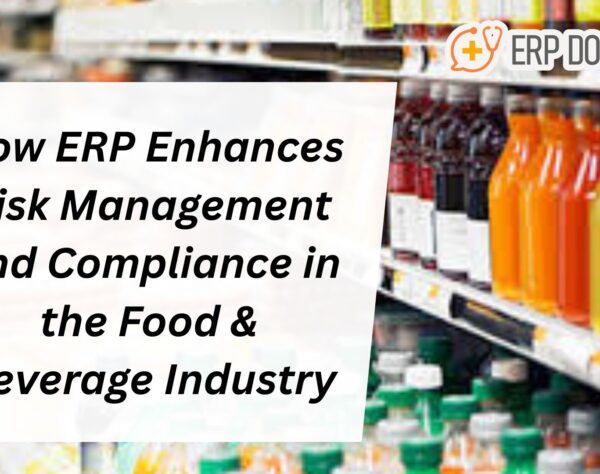
Sowing the Seeds of Success: ERP Impact on Chemical Fertilizer Business Growth

ERP for Sustainable and Scalable Chemical Fertilizer Industry Operations
The chemical fertilizer industry is a vital part of global agriculture, providing the essential nutrients that crops need to grow and thrive. However, this sector also faces numerous challenges, from fluctuating raw material prices and regulatory compliance to inventory management and distribution complexities. To stay competitive, companies in the chemical fertilizer industry are increasingly turning to modern ERP (Enterprise Resource Planning) solutions like ERP. This blog explores how ERP for Chemical Fertilizer Industry is revolutionizing operations and driving growth.
What is ERP ?
ERP is an integrated solution designed for small to medium-sized enterprises (SMEs) across various industries. It helps streamline business processes by automating operations such as finance, inventory, procurement, and sales. With real-time data insights, ERP enables businesses to make informed decisions, enhance operational efficiency, and drive growth.
When tailored to the specific needs of the chemical fertilizer industry, ERP software for Chemical Fertilizer Industry becomes a game-changer, offering unique solutions to tackle the sector challenges. Whether it’s improving supply chain management, enhancing compliance with regulatory requirements, or optimizing inventory processes, ERP for Chemical Fertilizer Industry is a powerful tool for long-term success.
Key Challenges in the Chemical Fertilizer Industry
Before diving into the benefits of ERP for Chemical Fertilizer Industry, it’s essential to understand the common challenges faced by businesses in this sector:
- Complex Supply Chain Management: The chemical fertilizer industry deals with numerous suppliers of raw materials, fluctuating prices, and a wide distribution network. Efficiently managing this complex supply chain can be difficult without a centralized system.
- Inventory Management: Fertilizer products often have long shelf lives but may need to be produced in large quantities to meet seasonal demand. Keeping track of stock levels, optimizing production schedules, and avoiding stockouts or overstocking can be overwhelming.
- Regulatory Compliance: The chemical fertilizer industry is heavily regulated. Companies must adhere to safety standards, environmental regulations, and quality control measures, all while maintaining accurate records and ensuring traceability.
- Cost Management: Raw material costs in the fertilizer industry can be volatile. Efficient cost tracking, budgeting, and financial forecasting are essential to stay profitable in such a dynamic market.
- Sustainability: As environmental concerns grow, the fertilizer industry is under increasing pressure to adopt sustainable practices, such as reducing the carbon footprint of production processes or transitioning to more eco-friendly products.
How ERP Solves These Challenges for the Chemical Fertilizer Industry
1. Streamlining Supply Chain Operations
ERPsolutions for Chemical Fertilizer Industry allows businesses to manage their supply chains more efficiently. The solution integrates all stages of the supply chain, from procurement to production to distribution. By providing a 360-degree view of operations, ERP ensures that companies can:
- Track raw materials in real-time, optimizing purchasing decisions and reducing the risk of supply shortages.
- Automate purchase orders and supplier invoicing, saving time and reducing manual errors.
- Monitor supplier performance to ensure that high-quality raw materials are consistently delivered on time.
These capabilities enable companies to keep production costs in check while ensuring that they can meet demand without overstocking or understocking.
2. Optimizing Inventory Management
Inventory management is crucial in the fertilizer industry, given the high value of raw materials and the need for precision in production schedules. ERP software for Chemical Fertilizer Industry simplifies inventory management by offering real-time tracking and automated processes. Key features include:
- Batch and serial number tracking: This ensures that products can be traced from raw material to finished goods. This is particularly useful for adhering to quality control standards and regulatory compliance.
- Real-time stock visibility: With SAP B1, companies can access real-time data on stock levels, sales, and production status. This ensures that fertilizer companies can accurately forecast demand and adjust inventory levels accordingly.
- Automated stock reordering: ERP Implementation for Chemical Fertilizer Industry can be set to automatically reorder stock based on predefined thresholds, preventing stockouts and minimizing the need for manual intervention.
By improving inventory management, ERP software for Chemical Fertilizer Industry helps businesses reduce waste, improve stock rotation, and optimize production cycles.
3. Ensuring Regulatory Compliance
The chemical fertilizer industry is subject to strict regulations related to safety, environmental impact, and product quality. ERP for Chemical Fertilizer Industry streamlines compliance by automating record-keeping, reporting, and quality control processes. Features such as:
- Document management: ERP stores all critical documents, certifications, and records in one place, making it easier to track and retrieve information for audits or inspections.
- Quality control modules: With SAP B1, companies can set up quality checks at various stages of production, ensuring that each batch of fertilizer meets regulatory standards.
- Regulatory reporting: The system can automatically generate compliance reports and help companies stay up to date with changing regulations.
This ensures that companies in the chemical fertilizer industry can maintain consistent product quality and avoid costly fines or penalties.
4. Improving Financial Management and Cost Control
Given the volatility of raw material prices and the complex nature of fertilizer production, effective financial management is critical. SAP B1’s comprehensive financial management features help businesses in the fertilizer industry streamline budgeting, financial forecasting, and cost analysis. Key financial features include:
- Real-time financial data: ERP solutions for Chemical Fertilizer Industry provides up-to-date financial information, enabling businesses to track expenses, monitor cash flow, and make informed decisions.
- Cost tracking by production batch: ERPenables businesses to track production costs by batch, helping them pinpoint inefficiencies and optimize production processes.
- Financial reporting: With built-in financial reporting tools, companies can generate reports that provide insights into profit margins, cost trends, and pricing strategies.
By enabling better financial visibility and control, ERPfor Chemical Fertilizer Industry helps businesses reduce waste, optimize costs, and improve profitability.
5. Enhancing Sustainability Practices
Sustainability is becoming a key driver in the chemical fertilizer industry, as consumers and governments alike are demanding greener practices. ERPhelps businesses adopt more sustainable practices by:
- Tracking energy consumption and carbon footprint: By monitoring energy usage and emissions, businesses can take steps to reduce their environmental impact.
- Optimizing production processes: ERP solutions for Chemical Fertilizer Industry can help optimize fertilizer production by identifying waste and inefficiencies, leading to more sustainable manufacturing practices.
- Supporting green product lines: As companies move towards eco-friendly fertilizers, ERPcan help manage the production of these products, track certifications, and maintain transparency in the supply chain.
By leveraging ERP Implementation for Chemical Fertilizer Industry sustainability features, businesses can not only comply with environmental regulations but also cater to the growing consumer demand for eco-friendly products.
Why Choose ERP for Chemical Fertilizer Industry?
The implementation of ERPfor Chemical Fertilizer Industry offers significant advantages:
- Improved Operational Efficiency: With automation and streamlined processes, companies can reduce manual work, eliminate errors, and enhance productivity.
- Increased Visibility: Real-time data and analytics give businesses the insight they need to make faster, more informed decisions.
- Scalability: As your business grows, ERPgrows with you, offering the flexibility to scale operations without compromising performance.
- Cost Savings: By optimizing supply chain management, inventory control, and financial forecasting, businesses can reduce costs and improve profitability.
- Regulatory Compliance: ERPensures that your business adheres to industry regulations and maintains high-quality standards, reducing the risk of fines or product recalls.
ERP solutions for Chemical Fertilizer Industry is a powerful solution that helps businesses streamline operations, manage complex supply chains, improve inventory control, and enhance regulatory compliance. With its customizable features, real-time insights, and scalability, ERP is transforming the way companies in the fertilizer industry operate, enabling them to remain competitive in a rapidly evolving market.
By integrating ERP into your operations, your business can achieve greater efficiency, improve financial management, and drive sustainable growth in the chemical fertilizer sector. If you’re ready to unlock the full potential of your business, ERP Implementation for Chemical Fertilizer Industry is the key to success.
Visit ERP Doctor for Expert ERP Solutions and Support
Want to speak to an expert? Fill in the form below, and we will be in touch with you shortly!





